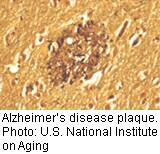- Could Your Grocery Store Meat Be Causing Recurring UTIs?
- Are You Making This Expensive Thermostat Error This Winter?
- Recognizing the Signs of Hypothyroidism
- 10 Strategies to Overcome Insomnia
- Could Artificial Sweeteners Be Aging the Brain Faster?
- Techniques for Soothing Your Nervous System
- Does the Water in Your House Smell Funny? Here’s Why
- Can a Daily Dose of Apple Cider Vinegar Actually Aid Weight Loss?
- 6 Health Beverages That Can Actually Spike Your Blood Sugar
- Treatment Options for Social Anxiety Disorder
Mouse Study Suggests Immune Disorder May Play Role in Alzheimer’s


An immune system disorder may play a role in the development of Alzheimer’s disease, research in mice suggests.
Duke University researchers found that in a mouse model of Alzheimer’s, something goes wrong with certain immune cells that normally protect the brain, and the cells start to consume an important nutrient called arginine.
In mice, treatment with a drug called difluoromethylornithine (DFMO) blocked these immune cells from consuming arginine and prevented the brain plaques and memory loss associated with Alzheimer’s.
However, findings in animals are not always duplicated in humans.
The study was published April 15 in the Journal of Neuroscience.
“If indeed arginine consumption is so important to the disease process, maybe we could block it and reverse the disease,” senior study author Carol Colton, a professor of neurology and a member of the Duke Institute for Brain Sciences, said in a Duke news release.
DFMO is currently being tested in human clinical trials to treat some types of cancer, but has not been tested as a potential treatment for Alzheimer’s. In this study, DFMO was given to the mice before they developed Alzheimer’s symptoms. The researchers are now testing the use of the drug in mice after they develop Alzheimer’s symptoms.
Despite the findings, people should not eat more foods high in arginine or take dietary supplements in an attempt to protect themselves from Alzheimer’s disease, because it would do no good, Colton said.
“We see this study opening the doors to thinking about Alzheimer’s in a completely different way, to break the stalemate of ideas in AD,” she said. “The field has been driven by amyloid for the past 15, 20 years, and we have to look at other things because we still do not understand the mechanism of disease or how to develop effective therapeutics.”
More information
The U.S. National Institute on Aging has more about Alzheimer’s disease.
Source: HealthDay
Copyright © 2026 HealthDay. All rights reserved.










